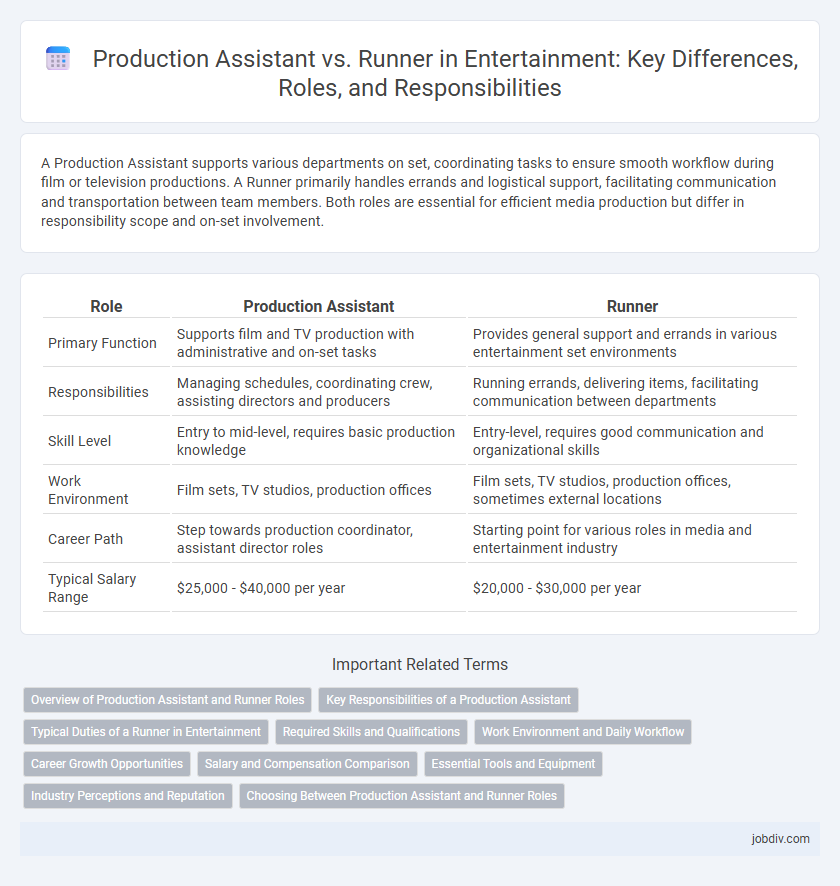A Production Assistant supports various departments on set, coordinating tasks to ensure smooth workflow during film or television productions. A Runner primarily handles errands and logistical support, facilitating communication and transportation between team members. Both roles are essential for efficient media production but differ in responsibility scope and on-set involvement.
Table of Comparison
| Role | Production Assistant | Runner |
|---|---|---|
| Primary Function | Supports film and TV production with administrative and on-set tasks | Provides general support and errands in various entertainment set environments |
| Responsibilities | Managing schedules, coordinating crew, assisting directors and producers | Running errands, delivering items, facilitating communication between departments |
| Skill Level | Entry to mid-level, requires basic production knowledge | Entry-level, requires good communication and organizational skills |
| Work Environment | Film sets, TV studios, production offices | Film sets, TV studios, production offices, sometimes external locations |
| Career Path | Step towards production coordinator, assistant director roles | Starting point for various roles in media and entertainment industry |
| Typical Salary Range | $25,000 - $40,000 per year | $20,000 - $30,000 per year |
Overview of Production Assistant and Runner Roles
Production Assistants (PAs) support film and television set operations by managing administrative tasks, coordinating schedules, and assisting various departments to ensure smooth production flow. Runners perform entry-level duties such as delivering messages, fetching equipment, and handling errands to support the crew on set or in production offices. Both roles are essential for efficient project execution but differ in responsibility scope and on-set involvement.
Key Responsibilities of a Production Assistant
A Production Assistant (PA) manages on-set coordination, handles talent and crew communication, and ensures smooth daily operations during filming. Key responsibilities include distributing scripts, organizing equipment, and assisting department heads to maintain production schedules. Unlike a Runner, who primarily performs errands and basic support tasks, a PA plays an integral role in the overall workflow and problem-solving on set.
Typical Duties of a Runner in Entertainment
A runner in entertainment typically handles logistical support such as delivering equipment, managing set supplies, and coordinating transportation for cast and crew. They ensure smooth communication by relaying messages between departments and assist with basic administrative tasks like printing scripts and organizing call sheets. Runners play a vital role in maintaining the efficiency of production workflows, often working long hours to meet tight schedules on set.
Required Skills and Qualifications
Production Assistants require strong organizational skills, basic technical knowledge of film equipment, and the ability to manage schedules and communicate effectively with different departments. Runners need excellent multitasking abilities, physical endurance for on-set errands, and a proactive attitude to handle spontaneous tasks efficiently. Both roles benefit from teamwork, reliability, and a foundational understanding of the production process, though PAs often have slightly more specialized qualifications.
Work Environment and Daily Workflow
Production Assistants typically operate within structured film or television set environments, managing communications, scheduling, and logistical support to ensure smooth daily operations. Runners often work in fast-paced, entry-level roles across studios, production offices, or on-location sets, handling varied tasks like errands, equipment transport, and basic crew assistance. The daily workflow for a Production Assistant involves coordinating between departments and tracking production needs, while Runners experience a more fluid range of responsibilities supporting immediate practical needs.
Career Growth Opportunities
Production Assistants gain hands-on experience in managing set logistics, providing a strong foundation for advanced roles like Coordinator or Assistant Director, enhancing career growth opportunities within film and TV production. Runners typically perform entry-level tasks that offer limited exposure to creative or decision-making processes, which may slow professional advancement. Choosing a Production Assistant position often leads to faster skill development and broader networking prospects crucial for long-term career progression in entertainment.
Salary and Compensation Comparison
Production assistants typically earn higher salaries than runners, with average pay ranging from $30,000 to $40,000 per year, depending on experience and location. Runners usually receive lower compensation, often between $20,000 and $28,000 annually, reflecting their entry-level status in entertainment production. Benefits for both roles vary widely, but production assistants may access more comprehensive packages due to their broader responsibilities and longer-term contracts.
Essential Tools and Equipment
Production assistants rely on communication devices like walkie-talkies, smartphones, and digital schedules to coordinate tasks efficiently on set. Runners primarily use basic tools such as clipboards, notepads, and keys to manage errands and logistics swiftly. Both roles benefit from wearable gear like comfortable shoes and portable chargers to maintain productivity during long shoots.
Industry Perceptions and Reputation
Production Assistants are viewed as essential entry-level roles with a reputation for gaining diverse on-set experience and industry knowledge quickly. Runners are often perceived as more temporary or support-focused positions, valued for reliability but sometimes seen as limited in creative or technical exposure. Industry professionals consider Production Assistants as stepping stones to specialized careers, while Runners are recognized for building foundational connections and demonstrating strong work ethic.
Choosing Between Production Assistant and Runner Roles
Choosing between Production Assistant and Runner roles in entertainment depends on career goals and job responsibilities. Production Assistants often handle specific tasks such as coordinating schedules and managing communication, providing a broader understanding of production processes. Runners typically perform entry-level errands and support duties, ideal for gaining on-set experience and networking opportunities.
Production Assistant vs Runner Infographic

 jobdiv.com
jobdiv.com